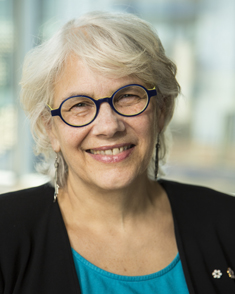Dalhousie bioethicist Françoise Baylis has been named to a prestigious multidisciplinary committee that will plan the Third International Summit on Human Genome Editing being held in London next year.
 Dr. Baylis, a University Research Professor in Philosophy at Dalhousie and author of Altered Inheritance: CRISPR and the Ethics of Human Genome Editing, will join representatives from 11 nations in planning the three-day summit at the Francis Crick Institute next March. The summit is being organised by the UK Royal Society and Academy of Medical Sciences, the U.S. National Academies of Sciences and Medicine and UNESCO-The World Academy of Sciences for the advancement of science in developing countries.
Dr. Baylis, a University Research Professor in Philosophy at Dalhousie and author of Altered Inheritance: CRISPR and the Ethics of Human Genome Editing, will join representatives from 11 nations in planning the three-day summit at the Francis Crick Institute next March. The summit is being organised by the UK Royal Society and Academy of Medical Sciences, the U.S. National Academies of Sciences and Medicine and UNESCO-The World Academy of Sciences for the advancement of science in developing countries.
Building on the work of the previous international summits in 2015 and 2018, the gathering will inform and generate debate around the uses of genome editing technologies in humans by bringing together participants from a range of countries. It also is intended to foster greater engagement with the genetic disease and disability communities, as well as companies developing genome editing therapies.
The summit will give experts a chance to discuss the findings and recommendations of the 2020 report of the International Commission on the Clinical Use of Human Germline Genome Editing and the 2021 reports by the WHO’s Expert Advisory Committee on Developing Global Standards for Governance and Oversight of Human Genome Editing (of which Baylis was a member).
Dr. Baylis, a member of the Order of Canada and the Order of Nova Scotia, a Fellow of the Royal Society of Canada and of the Canadian Academy of Health Sciences, is a philosopher whose innovative work aims to move the limits of mainstream bioethics and develop more effective ways to understand and tackle public policy challenges.
Ealier this month, she was elected as a member of the governing board for the International Science Council (ISC) — an organization that promotes science as a global public good. She'll provide scientific and strategic leadership to the ISC in the role over a three-year term. That's in addition to the impact she has as a member of the WHO Working Group on Principles of the Global Guidance Framework for the Responsible Use of the Life Sciences and the Royal Society of Canada Committee on Public Engagement.
Advancing a global dialogue
It is key that there is global dialogue and collaboration on the safe and ethical application and use of human genome editing technologies. While these technologies offer promising new pathways to treat a variety of diseases, there are significant questions about how to ensure equitable access.
“These are critically important issues and we are proud that Dr. Baylis will be at the centre of shaping these discussions,” says Alice Aiken, vice-president Research and Innovation. “She is a leading scholar in health-care ethics and a passionate advocate for ethics-based health policy decision-making.”
It is expected that international stakeholders representing the academic, medical, regulatory, bioethical and patient communities will discuss a broad range of considerations regarding human genome editing. That will include:
- An update on advances in science and techniques in non-heritable and epigenetic genome editing since the 2018 summit
- Current clinical research involving non-heritable genome editing and barriers to clinical applications
- The state of the science for germline genome editing in embryos and gametes
- Policy approaches to increase capacity and accessibility to treatments for genetic diseases globally
- Ethical, societal and cultural considerations surrounding human genome editing
- And, the role of non-scientists in setting the research agenda.
Details for the summit, which runs from March 7 to 9, 2022, can be found on the organization’s event page.
Comments
comments powered by Disqus
